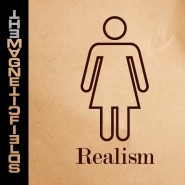 The Magnetic Fields
The Magnetic FieldsRealism
Score: 49
NYC band The Magnetic Fields, founded by frontman Stephin Merrit in 1989, released its newest album, Realism, last month. Realism is a bit of a departure from form for the Fields, who, while their last few albums have moved away from the synthy experimentation of their first five or six albums, have with Realism injected a folk-like aesthetic into their peculiar blend of indie-pop. While Realism suffers from a substantial number of flaws and seemingly misguided decisions, the Fields’ creativity shines through at the best moments, leaving the album at least occasionally interesting.
As with the majority of Magnetic Fields albums, Merrit provides the majority of the vocals for Realism, occasionally with substantial effects on top. At certain points on Realism (and through much of his band’s music), Merrit’s voice works perfectly - a calm and deep intonation well-suited to the more subdued tracks, such as Realism’s closing track, “From A Sinking Boat.” However, in many places, an overuse of effects (especially on secondary vocalist Claudia Gonson’s sections) pushes Realism’s vocal segments towards being irritating rather than beneficial to the music. In the case of Gonson’s vocals, it also doesn’t help that she can’t seem to avoid sounding irritating without any effects whatsoever, though Merrit is fortunately the main vocalist most of the time. When Merrit’s vocals work, everything seems to come together. We just wish that happened much more often.
As with much of The Magnetic Fields’ work, Realism is a combination of more serious tracks (such as “From A Sinking Boat”) and tracks which use humor or humorous settings to varying effect. There’s “Interlude,” which does little but to serve as a somewhat confusingly misguided interlude (unsurprisingly) between “You Must Be Out of Your Mind,” which includes the amusing line “And I no longer drink enough / To think you’re witty,” and “We Are Having A Hootenanny,” which, given its awful lyrics (see its title), is most distinguished by its use of the word “hootenanny” and the decision to extend the vaguely sibilant sounds at the end of words such as “quiz” into a buzzing noise. After that there’s “I Don’t Know What To Say,” which displays Merrit’s skill at writing - and then “The Dolls’ Tea Party,” which doesn’t. After the beautifully sarcastic “Everything Is One Big Christmas Tree” (which at one point breaks into German), the album fluctuates between interesting and markedly mediocre - the difference between “Seduced and Abused” and “Painted Flower.” At 35 minutes, Realism is short enough that suggesting that some of the worst tracks be thrown out is unhelpful, but it’s quite disappointing to have really good tracks sandwiched between mediocrity.
For an album that takes a step back from experimentation in favor of some extra folk, Realism is surprisingly diverse. It seems that even though the band’s experimental tendencies have been focused upon folk, they can’t help but still play around with all sorts of instrumentation, among other elements. In fact, one of the only things more impressive than the variation in instrumentation is the use of an extremely large tonal range, easily likened to that of a full organ (some of which venture as low as 4Hz, and span over 8 octaves). And this extreme use of range is found not only with instruments, but also, often, with the vocals.
But even while on much of the album The Magnetic Fields make a point of remaining, to some extent, experimental, there is a core set of tracks that remains mostly the same. These tracks, while often attempting to broaden their sound base, generally just revert right back to using a rather simple guitar line, plus assorted accompaniment. Placed among the other, much more interesting tracks, these are simply boring.
Realism as a whole maintains diversity not only in sound, instrumentation, range, tempo, and so on, but also in overall quality. There are certainly a good number of very solid tracks, then there are the fairly decent, but somewhat mediocre tracks, and Realism entertains the truly awful tracks, such as “We Are Having a Hootenanny,” with its somewhat painful lyrics and the irritating buzzing with which the vocalists fill otherwise empty measures. As a whole, Realism is right about mediocre.
This post is tagged 40-49, The Magnetic Fields